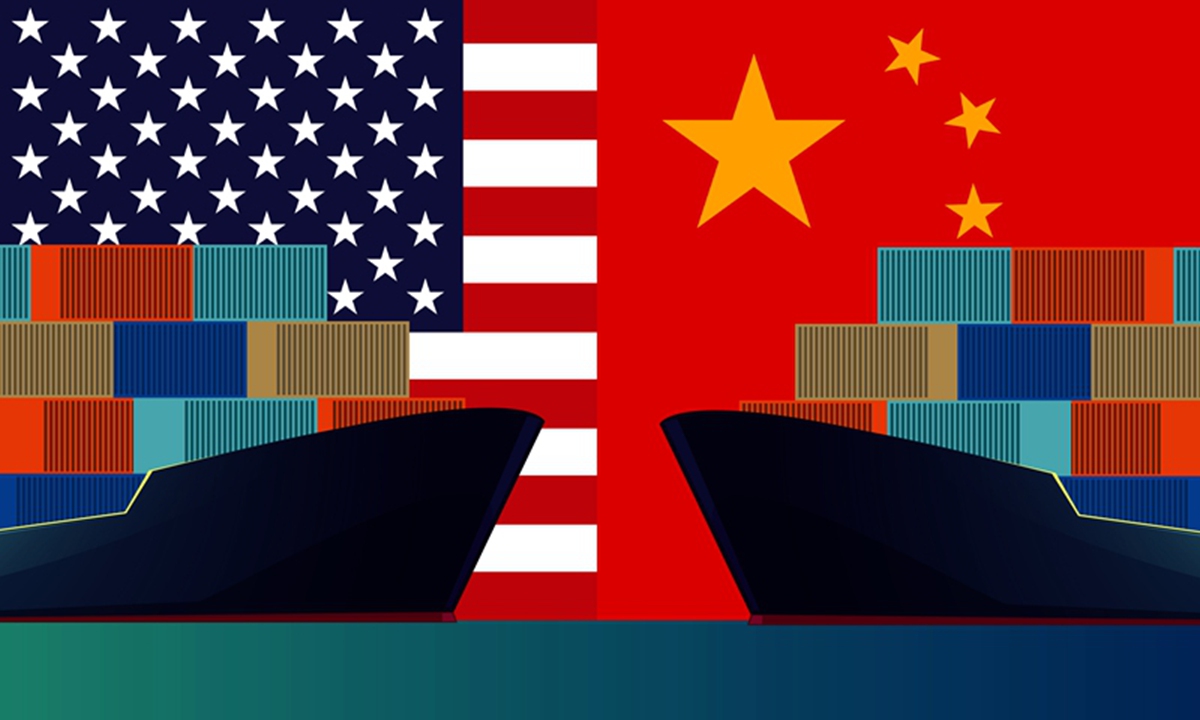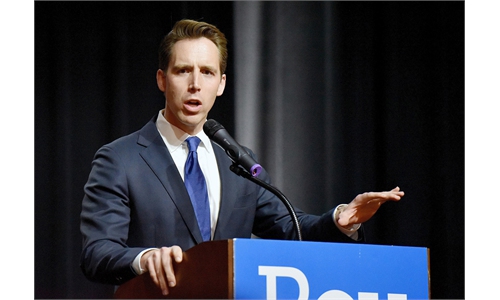
China US Photo: GT
In her first interview since Senate confirmation, US Trade Representative Katherine Tai revealed the Biden administration's reluctance to drop tariffs yet its receptiveness to negotiations with China, sending a mixed message about the prospect of bilateral talks after barbs were traded at the high-level strategic dialogue in Alaska.
Tai's remarks indicate Washington's lack of sincerity in immediately starting new trade talks with China, experts said on Monday, calling for candid efforts on the part of the US to correct its misguided actions targeting China for there to be renewed engagement between the two economic superpowers.
The US isn't ready to lift tariffs on Chinese goods in the near future, but it might be open to trade negotiations, the Wall Street Journal reported on Sunday, citing Tai.
Tai acknowledged the toll that the tariffs exacted on US businesses and consumers, but said they were imposed "to remedy an unbalanced and unfair trade situation." The hardline apparently runs contrary to the interests of many US businesses.
A coalition of three dozen trade associations that represent industries ranging from automobiles to beer and retailers has been assembled by the National Foreign Trade Council, a US trade association of big exporters, to press the Biden administration for tariff repeal.
Questions sent to other US trade chambers and industry associations including the Association of Chamber of Commerce Executives, USTelecom, the American Iron and Steel Institute, and the American Chemistry Council went unanswered on Monday.
China has long advocated the necessity of talks with the US and the pursuit of cooperation instead of confrontation, but the continuation of negotiations must be pushed on the premise of working within WTO multilateral framework, said He Weiwen, a senior fellow at Chongyang Institute for Financial Studies of Renmin University of China and former economic and commercial counselor of Chinese consulates in San Francisco and New York.
Bilateral talks should not be based on the Biden administration's trade agenda, He told the Global Times on Monday, adding that China-smearing rhetoric, as shown in the US' China narratives during the Alaska talks that target China's Xinjiang, Taiwan and Hong Kong, essentially makes future talks very difficult.
Taiwan, Hong Kong and Xinjiang are inalienable parts of China, and the US should stop its interference in China's internal affairs and avoid confrontation, senior Chinese official Yang Jiechi said at the start of the Alaska talks.
The US is not qualified to talk to China in a condescending manner, and the Chinese people will not accept that, said Yang, adding that the US side must show mutual respect to deal with China, and history will prove that those who seek to strangle and impede China's rise will suffer in the end.
The use of tariffs imposed on Chinese goods as a bargaining chip indicates the US government' reluctance to proceed in talks with China, as the imposition of tariffs is by its very nature illegal under WTO principles and should by no means be relied on to coerce China to make a compromise, He commented, urging the US government to rectify its wrongdoings and abandon the fallacy that bilateral talks would continue with China budging on issues concerning its sovereignty and fundamental interests.
"Multilateralism is a prerequisite for renewed engagement," He said.
Still, as some observers pointed out, the possibility of the two economies restarting trade talks was left open.
The latest message shows the Biden administration's intention to pressure China into ramped-up purchases of US agricultural and energy products under the phase one trade deal, Gao Lingyun, a research fellow at the Institute of World Economics and Politics of the Chinese Academy of Social Sciences, told the Global Times on Monday.
The implementation of the phase one deal is still contingent upon the US' domestic COVID-19 containment progress, according to Gao, a close follower of the China-US trade tensions.
It's possible that some sort of re-engagement might happen in especially the second half of 2021, Gao said, citing the forthcoming Leaders' Climate Summit in April.
US President Joe Biden has invited 40 world leaders to attend the virtual summit on climate change, and the Chinese and Russian leaders were among those invited, according to the White House.
In addition to intellectual property rights protection and imports of US agricultural goods, human rights topics might be among the key points of contention along the path of future bilateral talks, Gao added.
And, ongoing boycotts by Chinese consumers against foreign apparel and sportswear retailers including Nike over their refusal to source Xinjiang cotton on fabricated forced labor allegation, signifying discontent at the grassroots level, are less likely to hamper China-US trade talks, Gao remarked.


